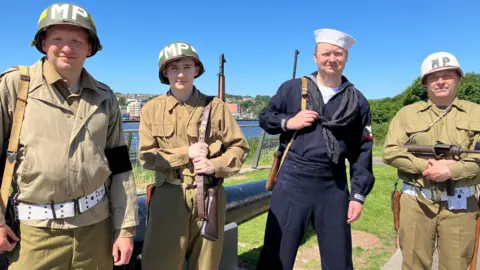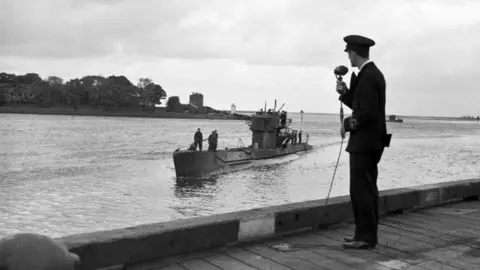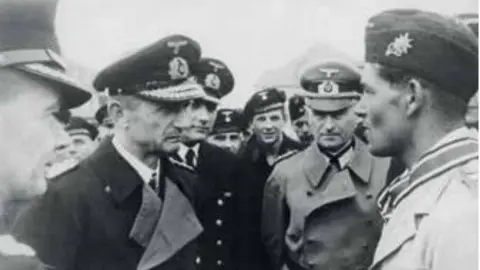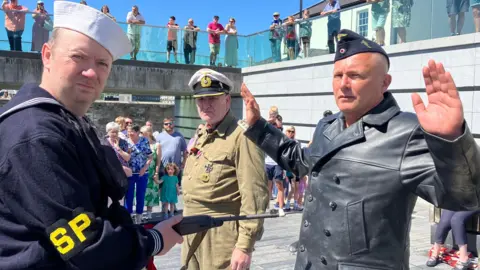Derry remembers Battle of the Atlantic 80 years on
 BBC
BBCA special event recreating wartime in Londonderry has taken place to commemorate the city's role in the Battle of the Atlantic.
The naval base in the city - shared by the Royal Navy, the Royal Canadian Navy and the United States Navy – was pivotal to winning the longest continuous military campaign of World War Two.
At one time, 140 Allied escort ships, vital to the protection of convoys in the Atlantic, were based on the River Foyle and in May 1945 eight German U-boats surrendered close to the city.
A recreation of the German surrender took place place at Ebrington Square on Saturday, where a number of wartime museum collections have been on display over recent days.
"Derry is a city steeped in history and often we forget its strategic importance during World War II, although in terms of global significance it played a huge role," the city's mayor Lilian Seenoi Barr told BBC News NI.

What was the Battle of the Atlantic?
The Battle of the Atlantic was fought for control of vital supply routes, beginning as war broke out in 1939.
German submarines were the Allies' principal threat at sea. Winston Churchill once wrote: "The only thing that really frightened me during the war was the U-boat peril."
Skirmishes in the Atlantic continued until the war ended in 1945, but the Allies sank particularly large numbers of U-boats in May 1943, effectively winning the Battle of the Atlantic.
Thousands of merchant ships and tens of thousands of lives were lost during the longest continuous military campaign during World War Two.
More than 66,000 Allied merchant seamen, sailors and airmen died, with 175 Allied warships and 5,000 merchant ships destroyed by German U-boats.
Derry is acknowledged as the Allies' most important escort base during the Battle of the Atlantic.
On 14 May 1945 the first of the U-boats berthed at Lisahally, the naval port on the city's outskirts, were formally ordered to surrender by Admiral Sir Max Horton.
 Derry City and Strabane District Council Archive Collection
Derry City and Strabane District Council Archive CollectionThe mayor said as well as holding such vital strategic importance during the Atlantic campaign, the city was also changed by the influx of north American service personnel, housed at Base One Europe, the US Navy's operating base in Northern Ireland.
"The billeting of Allied servicemen here during that time also had a major cultural influence here in the city, where people mingled with the US and Canadian forces," she said.
Derry City and Strabane District Council's head of culture said Saturday's event will give people a sense of the historic significance of events in the city in 1945.

"We want to give people a snapshot of the era by re-enacting some of the events of the day, and the atmosphere of celebration as the city was freed from the shadow of the war," said Aeidin McCarter.
"Through our living history characters, we will retell the story and give people a glimpse of 1945 Derry through the music and fashion from the day."
The event at Ebrington ran until 17:00 BST, giving people a chance to enjoy the music of the roaring 40s and see how the fashion of the time began to reflect the international influence of the troops.
Military vehicles including a replica spitfire were also on display.
Earlier this week The Princess Royal visited Derry to attend a commemoration marking the 80th anniversary of the end of the Battle of the Atlantic.

Elaine Duffy attended the event and said she is very into the fashion and hairstyles of the 1940s.
She said she was "bringing a "female touch" to the proceedings.
"Women had amazing roles during that time and there are some amazing stories," she added.

Jonny McNee had a stall at the event showcasing a range of German, American and British pieces related to the war.
He said he was "giving people a chance to get hands on and get up close and personal with artefacts".
"It's Derry, the sun is shining, and we've been packed out since we opened - it's a great day out".

Rhoda Baxter, who lived in Derry when she was a child, visited to be a part of Saturday's event.
"My uncle Austin Ardill was a prisoner of war, for two years, he was presumed missing, but he managed to get home.
"He went on to become a politician."
